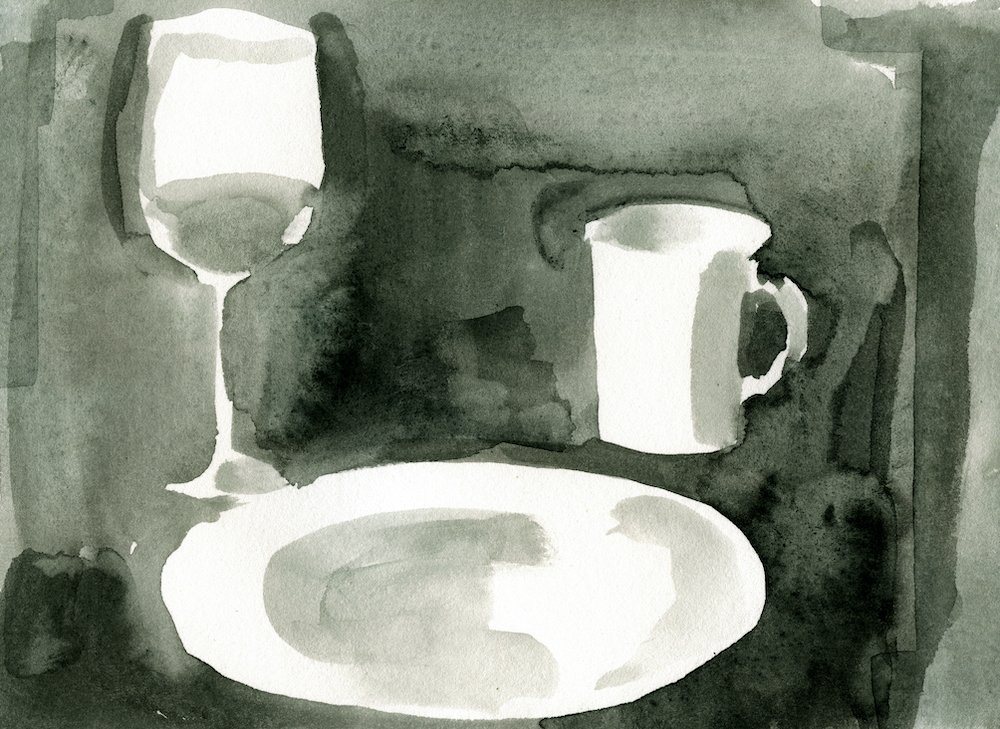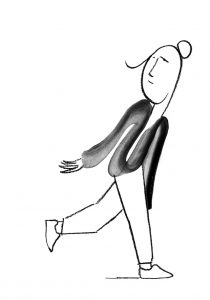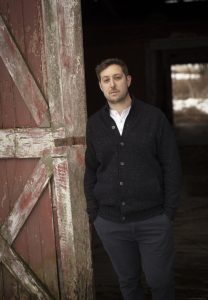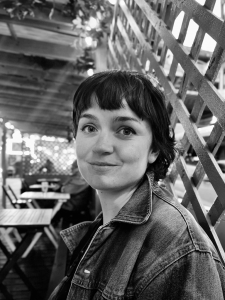“‘I am,’ says the narrator, ‘the first to admit that I’m usually a hectoring and difficult writer, given to obscurity and torturous sentences.’ Nevertheless he’s been given a prestigious residency in Berlin, where he plans to write a magnum opus about the experience of the self in lyric poetry. He’s hoping for solitude, a chance to think without having to interact with other people. Unfortunately, he’s discovered that there will be other fellows in residence, and he is expected to work with them in a communal space. As a result, he’s in a terrible mood. . .”
– Hari Kunzru

I
At Breakfast, I saw signs that other people had eaten before me. The empty cups and cereal bowls triggered all my most misanthropic impulses. Furtively, I looked around for a tray. When I couldn’t find one, I filled my pockets with fruit and bread rolls and carried a precariously piled plate and a mug of coffee out of the dining room. As I was going back upstairs, the friendly porter, Otto or Ulli, emerged from his lodge. He frowned at the plate of food I was carrying, as if he wanted to say something.
“You are going back to your room to eat?”
“Yes. Why?”
“No reason. Please, go ahead.”
Upstairs I pushed back the books and papers on my desk to make room for my breakfast. As I ate, I looked at the notes I’d made on “Wanderer’s Nightsong II.” They did not seem useful. By day, the poem might as well have been a shopping list. I sat for a long time with my coffee, looking out of the window at the lake. Not sure how to proceed, I listened to an old radio play by the French writer Georges Perec, called The Machine. It had been broadcast in 1968, when the new discipline of cybernetics, which promised to regulate and mechanize all sorts of messy human activities, seemed to be ushering in a sinister and rather antiseptic future. The play imagined a computer that had been programmed to perform endless algorithmic operations on the words of “Wanderer’s Nightsong II.” Recorded in German, the actors enunciated with robotic formality. The machine’s ‘“controller” had a female voice, and the three “processors” sounded male. They recited the poem at various speeds, omitting, shuffling, doubling and negating lines, adding and removing syllables and eventually rewriting the text in various styles (epic, humorous, comic) and adding extra material to explode it into “encyclopedic diversification.” Despite the computer’s fancy voice interface, it also seemed to be necessary to press buttons and feed punch cards into a slot, like operating a nineteen-sixties mainframe. As drama the play was a failure, but all the same I listened intently. Perec’s wit disguised a deep anxiety. He was performing a sort of autopsy of the poem, hunting for something among its entrails. Logically, if you’re afraid of death, you must feel you have something to lose. Perec was frantically shuffling the words of the poem, looking for this special something. By night I thought I’d found it. Now I could have taken a scalpel to my deepest feelings, and cut and cut until I was left with nothing but scraps.
That night I went down to dinner and found that my table by the window had been pushed together with another table and covered in a white cloth. A candle had been lit. Four place settings were laid around a small floral arrangement. Staring at those four place settings, I felt a twinge of panic. I had, in some way, fundamentally misunderstood the nature of the Deuter Center. There would be no meditative solitude. If I wanted to eat, I would have regular and unavoidable company at the end of every day. I was, admittedly, “on a fellowship,” and there is no getting round the incontrovertibly social meaning of that word. I’d even been sent some kind of list, though of course I hadn’t read it. Suddenly, the thought of human interaction was horrifying.
As if summoned from the pit, my three companions entered the room. I had the completely unfounded suspicion that they’d been watching me from the library, an oak-paneled den on the other side of the hall. I backed towards the row of windows that looked out on to the lake, baring my teeth in a fake smile. It was a terrible, brittle situation. It was like a scene from a violent computer game.
We made introductions and sat down. Finlay, the young black American art critic shot his cuffs and offered me his smooth dry hand. He was a formally dressed bird, pecking at the table, arranging his feathers and fixing his beady eye. He said almost nothing during the meal, surreptitiously checking his phone. He’d been at the Deuter Center for two months, and I formed the impression of a man in the trenches, a survivor of some heavy bombardment. He seemed on good terms with Laetitia, the elderly scholar of Chinese, who had the same shell-shocked fragility. A tiny Frenchwoman, possibly Eurasian, with an evident weakness for silver jewelry, she fussed agitatedly, almost knocking over a glass of water with a trembling bangled hand. The big guns belonged to Edgar the Neurophilosopher, an Endowed Chair in his sixties with the air of a prosperous pirate. He sported—that would be the word—a spade-like salt-and-pepper beard and had a physical bulk that somehow factored itself into the intellectual reckoning, as if his immense body were some kind of sign or metaphor for his mind. His every word and movement conveyed an overbearing practicality: a man like a hammer looking for a nail. He took an arch and combative tone with me, firing off questions, playfully letting on that he suspected there was more to me than met the eye.
“I haven’t seen you in the Communal Workspace,” he said.
“No.”
“Your station is untenanted, the bookshelves bare.”
He made an unlikely fluttering motion with his stubby fingers, as if the books had flown away like little birdies. The effect was horrific. I told him I preferred to write in my room.
“Protecting the sacred mysteries?”
I didn’t know what to say to that, so I nodded thoughtfully, as if acknowledging a cogent point. He tried again.
“Not wanting to show the class your workings?”
Laetitia summoned a wan smile. Beneath the lacy collar of her blouse, a tiny vein throbbed in her neck.
“You’re very daring,” she said to me.
Daring didn’t sound so good. Daring meant I’d made myself the object of gossip. Finding no suitable reply, I performed a sort of conversational lunge.
“What do you work on, Laetitia?”
Dutifully she began, in a quiet and rather circumspect way, to tell me. As she spoke, Edgar affected wolfish interest, dabbing his beard with his napkin and shifting in his chair, movements that made her flinch. Though nominally an archaeologist, she was essentially a textual scholar. Other people dug, she “merely interpreted the findings.” I couldn’t decide whether this modesty was genuine, or a plea to be allowed to slip back into silence, to remove herself from Edgar’s line of sight. The ancient Chinese aristocracy used ritual objects when making offerings to ancestral spirits. She was studying the inscriptions on these objects, mostly bronze vessels and bells. She was, she said, particularly interested in a group of artifacts that seemed to have come from the household of a royal functionary of the Western Zhou period.
“Which is?”
“Roughly the ninth century BC, Edgar.”
I see, he said, in the tone of a rich uncle bestowing a shiny penny on a young relative. The starter arrived, a little arrangement of smoked fish on a bed of salad. For a few blessed moments everyone concentrated on the food, but Edgar dispatched his portion in a few ruthless bites and resumed his interrogation.
“You say a royal functionary of—what was it?—the Western Zhou. You’ve never told me what function.”
“You’ve never asked. He was a shanfu. He transmitted the king’s commands.”
“I see.”
I couldn’t decide. Did Edgar not realize that Laetitia saw how transparently uninterested he was in her work, or did he just not care? He struck me as a man who might have trouble picking up on other people’s emotional cues. I could tell he was itching to turn the conversational spotlight on me. I was virgin territory, an unextracted natural resource. The dinner was already intolerable, more gruesome than I’d anticipated. I considered my options. Flight, the most attractive. I could be direct. Do it quick, like tearing off a plaster. How rude would it be just to push my chair back and leave the room? I hesitated too long. Cutting off Edgar’s half-uttered question (“and how about . . .” ) I hurriedly asked Laetitia more about her inscriptions. What kind of thing did they say? Were they extensive, or just a few words? I said fascinating a couple of times. The inscriptions sounded fascinating. The Western Zhou were fascinating. She gave me a pitying look. She understood that I was pleading.
“They usually describe the events that led to the vessel’s casting, usually a war, the rendering of some notable administrative service or the performance of a religious rite.”
“Fascinating.”
“And you? What about these hermetic scribblings of yours?” His blunt white fingers splayed on the table, Edgar had the bland but purposeful look of a farmer at the wheel of a tractor, surveying an unplowed field. “What aspect of the poetic oeuvre are you working on, up there in your attic?”
Irritated by the Frenchified sneer of “oeuvre,” I told him: lyric poetry, a textual technology for the organization of affective experience, a container in which modern selfhood had come to be formulated, and so on and so forth. I remember I said something about the tyranny of utility and something else about the relentless pressures of self-preservation. I tried to model my speech on Laetitia’s, speaking quietly, using a certain amount of jargon, making no wild claims. I hoped that Edgar would be bored enough to allow the conversation to move on elsewhere. Instead, to my dismay, he clapped his meaty palms together in glee. His scoff was physical, an ejection of air.
“Oho! We have a mystic on our hands!”
“I’m actually an atheist.”
“If you are, sir, I suspect you’re an atheist of a somewhat heretical stripe. I’m afraid I can’t give you a pass just because you say you’re not infected by the virus of religion. While I accept that there is a domain of literary language that uses words in, let’s say, a non-denotative way, I am a scientist, and as a man of science, I can’t allow anyone to plant weeds in the conceptual garden.”
“The what?”
I wanted to say to him, what are you talking about? I wanted to say, I’m not doing anything to your fucking garden. Instead, I stumbled on with my explanation. I tried to sound as technical as possible, defensively striving for a kind of ultra-rationality, the tone of a man speaking to another man out of the firm authority of his disciplinary manhood, but I could hear myself tripping up, giving garbled explanations of ideas that I usually found useful and clear.
Edgar called the waiter and had his wineglass refilled. He toasted me as he took a sip, a gesture that not only failed to be Falstaffian, but came across as actively prim.
“Why don’t we leave aside your use of the word technology. The idea of writing as a technology does have semantic content for me. But really, even if one accepts the continued cultural importance of poetry, as opposed to some mass medium, say television or social media, even radio, any of which would surely be more powerful and effective—if only in terms of reach, numbers participating—even then one has to ask about the mechanism by which poetry would do anything as powerful as, how did you put it, ‘reformatting contemporary selfhood’? I assume the use of a computer term is a metaphor, which I may discount?”
He appeared to be waiting for a yes or no. I nodded mutely, in the throes of a sudden physical crisis, a painful muscular spasm that was constricting my neck and shoulders. He took my silence as a sign that he’d already won the argument and could take his time to deliver the coup de grâce, allowing himself a few matadorial flourishes on the way.
“I could accept the possibility of a machine consisting of language, words assembled in a particular order which would act, perhaps via the dopamine system, to do measurable neurochemical work. I’m talking off the top of my head here, the exact mechanism is unimportant. But I wonder, wouldn’t the words be less a machine than a set of instructions for building one?”
Here, in the absence of some word or gesture from me, he inserted his own preference, doing a little dumb show of a person (presumably me) having a eureka moment.
“Now he gets it! The real machine would be the array of neurons in the brain! So we can rescue some meaningful thinking from what you said, but I’m sorry to say that for me the real problem starts much earlier. The “self” is just a folk notion. I am not trying to humiliate, simply stating a fact. The self is what we might call the elephant in the room when it comes to discussing the value of your sort of, what would you call it, cultural study? Before one starts to make wild claims about how to reprogram something, one is forced to ask, what is it that we’re reprogramming? This self that according to you, changes through history, and can be reconfigured by the unlikely means of poetry? To you, I mean, specifically. What
do you imagine you are speaking about when you say the word self?”
I know people throw around the phrase “my worst nightmare,” but several years earlier I had actually suffered from a recurring anxiety dream about being at a thesis defense, with a panel of sarcastic hectoring men—men like Edgar—as the examiners. When you’re angry, you’re at a disadvantage. You ought to be marshaling your materials, formulating your case, but you can’t concentrate because you’re vividly imagining your dinner companion swallowing bits of his wine glass. I spluttered something about Being, the quality I found in myself that was more than the sum of my parts. I used the word Gestalt. I couldn’t believe the garbage that was coming out of my mouth.
“So is it a little golden chap, sitting at the controls of that big mechanical body?”
“What are you talking about?”
“The self! Where is it? Where is it located?”
“Well, obviously when it comes to lyric poetry, it’s in the field of the poem. On the page.”
Edgar looked puzzled, and I congratulated myself on executing the postmodernist version of spraying mace in his eyes. Where is the self? What did he think I was going to say, the pineal gland? Recovering, he began to wonder aloud, in a tone that mixed pity and reproach, whether I understood that consciousness was essentially epiphenomenal, and my experience of having a self was perhaps not causal in the way I imagined. My “self” didn’t run things, Edgar told the table, like Poirot revealing that I was the one who did the murder. It was merely a sort of passenger, allowed occasionally to comment on the action. Experimental psychology and neuroscience had rather got ahead of the liberal arts, in Edgar’s opinion. My “lyric I” or whatever I wanted to call it, might, he granted, have value in the realm of intellectual history, but only as a poignant artifact of a period that was drawing to a close.
Red Pill is published by Simon & Schuster

This article is taken from issue 27. To buy the issue or subscribe, click here




